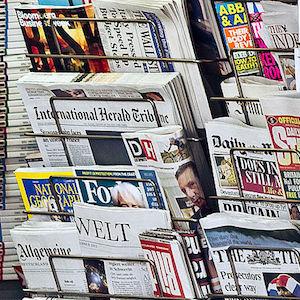New polling data from Pew shows that most Americans don't consume any science news whatsoever. Given how out of step the American public is with scientists over many key issues -- from the safety of GMOs to vaccines -- this probably doesn't come as much of a surprise.
According to the poll, 17% of Americans are active science news consumers, while 36% come across science news at least a few times per week. (Obviously, that means 64% do not, which is concerning in an age where science and technology affect much of our daily lives.)
What does come as a small (and pleasant) surprise is that the fraction of Americans who do pay attention to science news know that the mainstream media is a terrible place to get it1. Only 28% of Americans think that general news sources get their science facts correct most of the time. That's the same as the percentage of Americans who think the government gets science right most of the time.
A majority of Americans (54% and 52%) believe that museums and documentaries are accurate, respectively, and another 47% believe that specialty science news outlets do a good job.
Those are perfectly fine numbers, but how seriously should we take this poll?
Americans Lie to Pollsters
Unfortunately, polls about news consumption probably shouldn't be taken too seriously. In fact, many polls about our behaviors shouldn't be taken too seriously. The reason is because people don't like admitting to things that make them look bad2.
Consider reading. The Atlantic compiled data on the number of books Americans claim to have read over the years. In 2014, 45% of Americans said they read six or more books per year.
Do you really believe that? I don't. Given how demonstratively ignorant our society is on just about anything important, we have a compelling reason to suspect that the people surveyed lied in the poll. Why? Because claiming that you don't read many books makes you look stupid. If people lie about the number of fruits and vegetables they eat (and they do), then of course they will lie about how many books they read.
What does that mean for this poll? It means that the reported fraction of Americans who are "active science news consumers" is probably lower than reported3. In reality, it is probably far less than 17%. And it also means that the people who believe that specialty science news outlets are more accurate than general news outlets are also lying. The Pew poll supports that conclusion: While 47% of Americans say that science magazines are accurate, only 25% of Americans actually read them regularly. How can people possibly know if science magazines are more accurate than general news outlets if they don't read them?
This poll has all the hallmarks of people knowing what the "correct" answer is and responding accordingly. People know they are supposed to read science news, and they know that mainstream media has a bad reputation. So, the polling reflects that.
Notes
(1) We agree. See this chart we created of the best and worst news sites.
(2) For amusing anecdotes, watch Jimmy Kimmel's "Lie Witness News" or old clips from Jay Leno's "Jaywalking."
(3) If they aren't lying, then that means that people probably are reading mostly romance novels.




